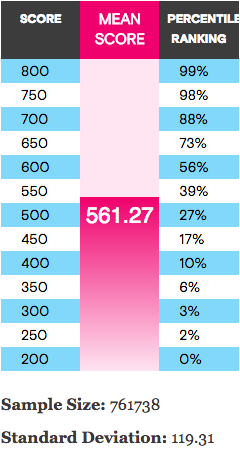Return on Investment
It's easy to talk about return on investment, and most of us know the concept. But for any given investment, it's usually not that easy to calculate the return. In some cases, even the investment is not known precisely. In such cases, it takes experience to make a good estimate of the return on investment.
THE TARGET SCORE
Because the GMAT is an adaptive test, your target score is a critical factor in estimating your return on investment, or ROI. For example, take a target score of 600, which is in not yet the 60th percentile. How should you hit that number? We have a more fully worked-out example here, but in either case it's clear that you do not need to invest in 700-level materials or coursework. 700 is the 90th percentile, more than 30 percentile points past the score you need to hit.
GMAT Score & Percentile Table
source: www.mba.com
PERCENTILE SCORES
Without factoring in the percentile rank of your target score, it's difficult to prioritize the subjects to study. In fact, because of the way the scoring algorithm selects the next best question, it's easy for a study plan to cover irrelevant ground. That's especially true for group courses, which usually don't differentiate between percentile scores and thus lump all students into the same classroom - regardless of difficulty level. But it's also true of most books, which usually cover all the topics, in maximum detail, and in no particular order; they are un-prioritized, and so it's up to you to figure out what level of difficulty is relevant for your target score.
RETURN ON INVESTMENT
The optimal study plan should also factor in budget and time constraints. Naturally you would like the study materials to be on-point, as relevant as possible, and delivered exactly in the way you like. When you put it that way, tutoring makes a lot of sense even to a cheapskate autodidact like me. You may even have a tight deadline, which argues against a course and even more strongly against self-study. Best to discuss your situation with an experienced professional who enjoys these topics. But to cut to the easy answer, if you have 4-6 weeks and a few hundred euros, then the best ROI is hands-down one of our group courses, each 32 hours long, inclusive of practice materials and full simulations, plus a 99th percentile subject-matter expert on-hand for feedback.

